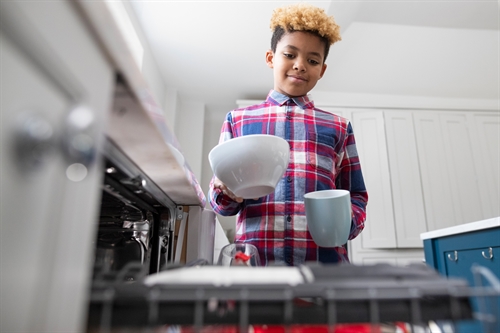Harness the power of your dishwasher to keep your world safe and sanitary.
What doesn’t go in the dishwasher?
There are a few items that are definitely not dishwasher safe – in general, if it’s irreplaceable, it shouldn’t go in the dishwasher.
- cast iron, pewter, aluminium, copper, chrome and silver items are not dishwasher safe
- electricals do not go in the dishwasher
- leather goods will not appreciate the cleansing power of the dishwasher
- wooden items will be damaged in the dishwasher
- unglazed ceramics are not dishwasher safe.
Note that you should avoid putting even aluminium foil that you are planning to recycle in the dishwasher as it can discolour other items.
There are a few sites suggesting using the dishwasher to clean mouthguards – but experts, like mouthguard manufacturer Sisu caution against this. Mouthguards can be costly, and you’ll want to care for them to ensure they look after your teeth, so follow your dentist’s instructions.
Tips for success using a dishwasher
Always check that the manufacturer does not specifically warn against using a dishwasher. Most plastic and silicone items are fine to be cleaned in a dishwasher, particularly if they are items that need to be kept clean but have a low replacement cost.
Lightweight items will be better cleaned in the top rack of a dishwasher. Smaller items can be placed in a mesh bag or box – otherwise you will be picking them out of the filter.
If in doubt, use a cooler, shorter cycle. And for larger items, it may be possible to run a cycle without the top rack in place.
Sports gear can go in the dishwasher
Shinpads can be sanitised in the dishwasher, and as they are lightweight, place them on the top rack. Putting muddy golf balls through a wash cycle will brighten them up, though it probably won’t improve your game.
A bathroom cleaning shortcut
You can use your dishwasher to clean many bathroom items. Plastic toothbrushes and toothmugs might benefit from a cycle in the dishwasher. Soap dishes, plastic or ceramic, too. Nail brushes and plastic combs can be cleaned in a dishwasher. Shower poofs and bath sponges can also go in the dishwasher. Plastic shower organisers can be cleaned in a dishwasher, as can glass jars used for bathroom storage.
Most bath toys will be fine on the top deck of the dishwasher, and it may hold off the dreaded black mould. Non-slip bathmats can also go in the dishwasher.
Kitchen utensils that go in the dishwasher
The kitchen sponge and washing up brush can go in the dishwasher, as well as any plastic caddies that you use for storing utensils. Cleaning kit like plastic buckets, dustpans and scrubbing brushes will all go safely through the dishwasher. Plastic compost buckets are often dishwasher-proof, too.
Microwave turntables and extractor fan covers can all be dishwashed. Some extractor fan filters need to go in the dishwasher, too. You can also put fridge shelves and drawers in the dishwasher, and this is a good way of cleaning your fridge before putting into storage.
Footwear can be washed in the dishwasher
Plastic footwear, like sliders and flipflops, can be safely freshened up in the dishwasher, and also unlined wellington boots.
Sanitise toys and teethers quickly and easily
Many plastic toys can be put in the dishwasher, particularly on the top rack. Use a mesh bag for smaller items. Note that paintwork and stickers might get damaged in a dishwasher cycle. Plastic and silicone teethers can be dishwashed, too. The official line from Lego is that you should not put the tiny plastic bricks in the dishwasher – but this is a judgement call for you to make, as many parents have done this and been pleased by the result.
We hope this collection of dishwasher hacks will add a bit of zing to your housekeeping routine!





